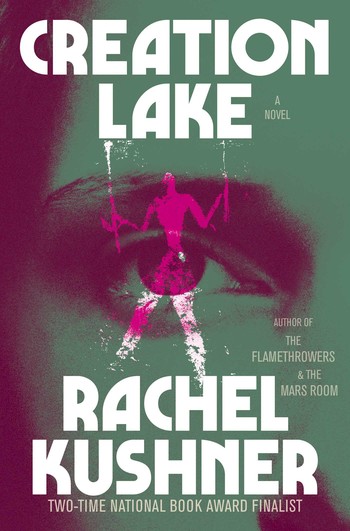“What is it people encounter in their stark and solitary four a.m. self? What is inside them?” asks Sadie Smith, the enigmatic narrator of Rachel Kushner’s captivating new novel, Creation Lake. “Not politics. There are no politics inside of people.”
And yet it is Sadie’s job to surround herself with people whose politics rule their lives. A former undercover FBI agent ousted for entrapment, Sadie (not her real name) has been hired by a group of unnamed “contacts” to infiltrate Les Moulinards, a radical environmentalist commune in rural southwestern France. Its members, already suspected of arson at a construction site, are protesting a government-sponsored “mega-basin,” which they believe will allow corporate farming to overtake the region.
Sadie seduces a young filmmaker to gain access both to his family’s country home, near the commune, and to his childhood friend, Moulinard leader Pascal Balmy. Pascal, Sadie decides, is a rich kid gone rogue, who believes that “throwing yourself into any project in this society is useless, except for the project of destroying this society.” But she becomes fascinated with Pascal’s mentor, Bruno Lacombe, who has spent the last twelve years living in caves, emerging only to send periodic e-mails to the group.
Unlike Pascal, Bruno’s worldview has been shaped by personal tragedy — a difficult upbringing, war, imprisonment, and the loss of a child. And in the caves, his unorthodox views have evolved from anarchy to anti-civilization. He believes Neanderthals (or “thals,” as he calls them) should have won the evolutionary race against Homo sapiens. And that the only hope for our poisoned planet is a return to our ancient ways of life.
As Sadie embeds further into the group and becomes more deeply engrossed in Bruno’s e-mails, which she has intercepted, she begins to question her own life. “People tell themselves, strenuously, that they believe in this or that political position,” she says. “But the deeper motivation for their rhetoric — the values that they promote, the lifestyle they have chosen, the look they present — is to shore up their own identity.” Who, then, is the real Sadie Smith? What does she stand for? The novel reaches its climax as a national politician announces a visit to the region for an agricultural fair, and the Moulinards plan a protest, with more nefarious goals. With pressure from her “contacts” and an increasingly complicated relationship with members of the commune, Sadie has to decide what she believes and what her role will be.
Kushner ’01SOA, a two-time National Book Award finalist, is known for her rich, multilayered storytelling, which in past novels has been channeled through a diverse set of voices and perspectives. In Creation Lake, which has already been longlisted for the 2024 Booker Prize, she uses only one narrator (two, counting Bruno’s e-mails), of questionable reliability. But what a narrator Sadie is. Daring, witty, and intensely cerebral, she upends every spy-novel cliché, propelling the genre into the modern age.



